
Care
The Honor of Being Us
Story by Eda Yu / Creative Direction by Eda Yu and Edward Yeung, Photography by Michelle Watt, and Styling by Heji Rashdi
28 May 2021

"It's an honor just to be Asian."
At the 2019 Golden Globes, actress Sandra Oh said those words after winning the award for Best Actress for her role in "Killing Eve." In a country where our inherent identity — where our mere existence as Asian Americans — has long felt like a liminal space, it was a rare moment where I felt whole and seen as myself, free from any in-between.
In the last two years, as anti-Asian and xenophobic sentiment has risen in response to COVID-19, it has also brought Asian American identity to the forefront of the national conversation. What, exactly, does it mean to be Asian in America? How do we reconcile finding our own cultural identity with the societal pressure to assimilate? When the word "Asian" spans 48 countries and 2,300 languages, how can we possibly come together?
And, as Asian American after Asian American was attacked this year, there's also the question I've turned over most in my head: At what point do we as a people stop asking for this country to grant us honor — to grant us belonging — and take pride in simply being who we are?
For me, finding the answers to those questions begins with understanding the history of Asian identity in America. It feels impossible to know the true potential of what we can be without being aware of our unique role in this country: As Claire Kim writes in The Racial Triangulation of Asian Americans, Asian Americans operate in a space of being perceived as perpetual foreigners — while simultaneously positioned on a scale of racial hierarchy as "superior" to Black communities and "inferior" to white ones.
Throughout history, our community has tried to shift that position upwards by buying into the white-dictated ideal of 'superiority' — overrepresenting our wealthy over our working class, or our 'successful' immigrants over our undocumented or refugees to gain privileges that come with proximity to whiteness. But those actions — alongside harmful stereotypes perpetuated by the model minority myth — fail to recognize the complexities of our identity in this country while pitting us against other BIPOC groups: They flatten what it means to be Asian American into a singular image and narrows the scope of the "Asian American struggle" to a wealthy, light-skinned, East Asian perspective.
Even now, few people know that Asian Americans have the highest income inequality of any group in the US. And fewer still know that the wage gap in our community is partially created by US immigration policy, which only allows for political asylum for refugees or visas for educated, upper-class Asians. The erasure of so much of our community is, of course, largely rooted in white supremacy; it's caused us to yearn for assimilation — to appeal to whiteness — rather than honoring who we actually are.
After a year of increased anti-Asian sentiment and violence, celebrating being Asian American can feel more difficult than ever. But at the same time, it's more important than ever for us to show the multiplicity of our identity — to challenge these perceptions — and to underscore the sheer diversity of our traditions, backgrounds and heritage.
Just as Sandra Oh said, the honor of being Asian is not something that we have to earn, or something that this country can ever bestow upon us or take away. Rather, honor is something ingrained in our identities — we are always carrying it with us, just as who we are.
Below, a diverse cast of Asian American creatives share stories that honor their heritage and identity, conceptualized by Eda Yu, Michelle Watt, Edward Yeung and Heji Rashdi.
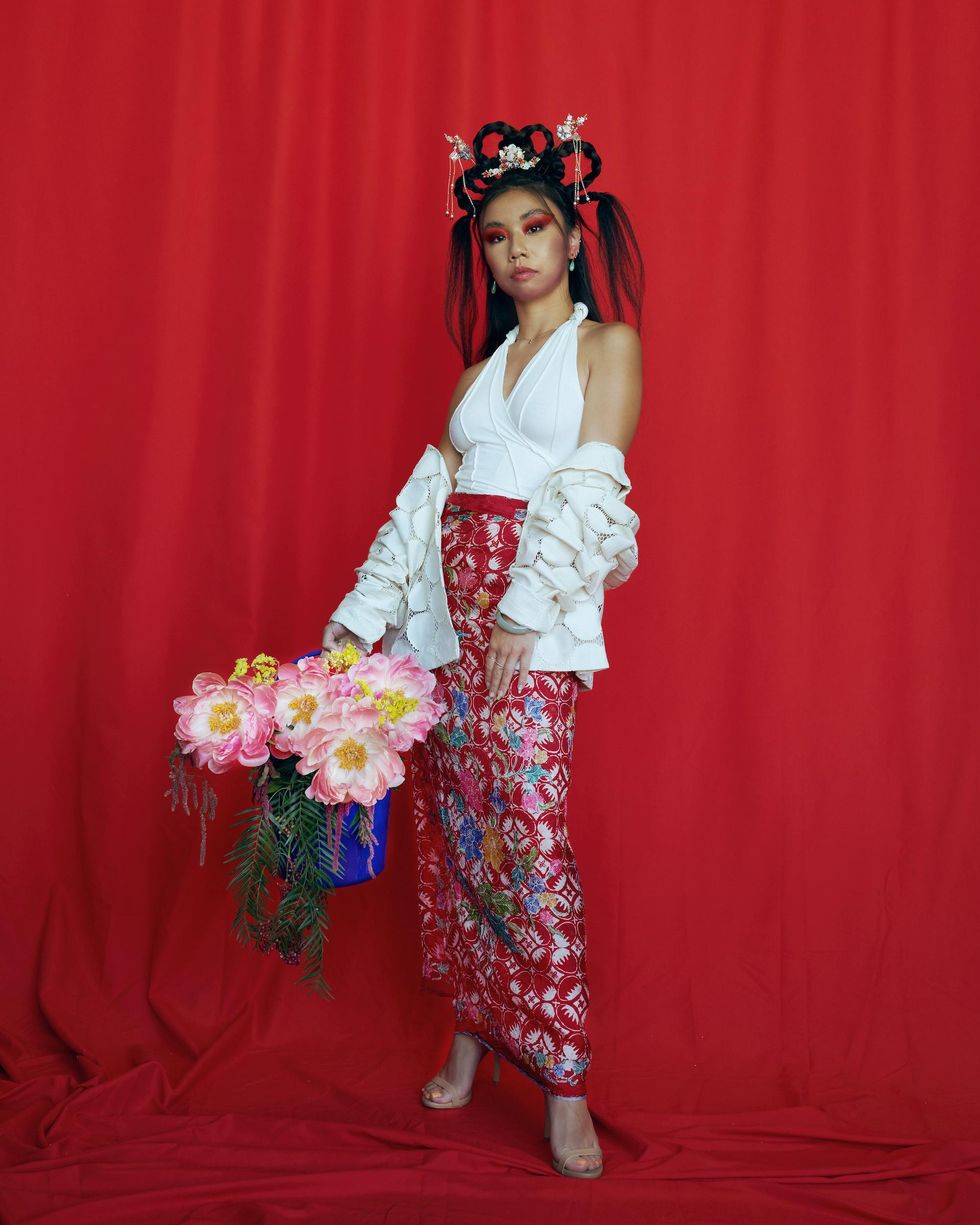
Headpiece: Eda's own, Earrings, bangle, rings: Shop Dela, Gold Top: Thursday Party, Jacket: TOMBOGO, Kebaya: Eda's own, Shoes: Steve Madden
Eda (she/her) is a Chinese and Indonesian writer and journalist born and raised in Los Angeles, CA.
"In a lot of ways, it was really difficult to grow up both East and Southeast Asian, especially when I was so close to both sides of my heritage when I was young. Throughout my childhood, some of my favorite memories were the summers my mom and I spent in Bandung and Jakarta, buying layer cake off of street vendors and using a plastic bucket to pour water over myself as a shower. But even though we were with our extended Indonesian family, I noticed folks often stared at me because of how different I looked from everyone there. To the average [non-Asian] American person, it might not be obvious that I'm even mixed Asian. But there, it's really noticeable because of my lighter skin tone and more Chinese features — especially when I dress in a Western style.
On the other hand, I faced an opposite experience within my own family too — where my grandma on my father's side didn't really accept my mom for some time. Our dynamic is totally different now, and we all really have grown beyond that to show love and mutual respect for each other. But I'll never forget — and I don't think my mom will either — how badly they made her feel for simply being Indonesian. For being darker, or not having the same socioeconomic status. It's crazy because even between our own communities, there's so much colorism and classism, and I really don't think we talk about that enough or do enough work to change it.
It's just crazy because I'm so proud of being Indonesian — I love being Chinese, but I connect to the warmth and vibrancy of my Southeast Asian culture in a whole different way. It's hard to imagine why people would want to diminish that pride."
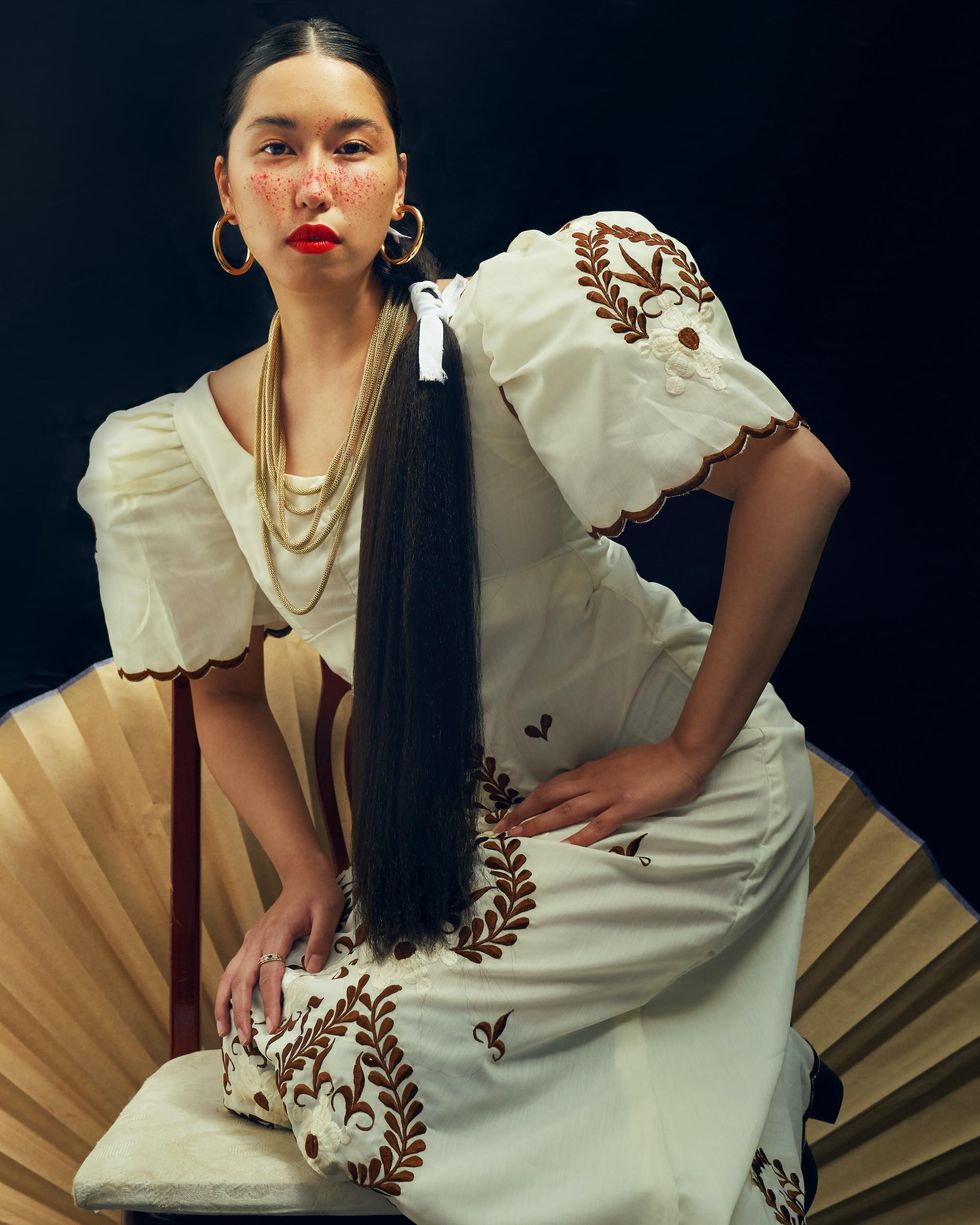
Earrings: Nicole's own, Necklace: Nicole's own, Dress: Nicole's own
Nicole (she/her) is a DACAmented creative director, visual artist and educator born in the Philippines. She moved to Los Angeles on November 2, 1999. She is a new asylum grantee.
"My migration story is centered around my family fleeing the Philippines, because of government corruption directly towards my family. About six months before we migrated, we were basically on lockdown and quarantine, fearing for our lives, because people were out to kill us — I had to stop going to school in second grade because there were [assailants the government supported] trailing me in school and trying to find out where I lived and where my parents were. They even came into my house and tried killing my parents in front of me.
[Since] we have family in the United States, my dad with the help of his brother, booked the tickets overnight, and we left the Philippines. I didn't even know I was coming. When my dad came home that day he was like, 'Pack up your stuff, we're going to Disneyland.' We didn't have any papers. We overstayed our visas, and then ICE was following us because the Philippines government basically had a warrant for our arrest. ICE detained my parents: They came to where we were staying at, like, four in the morning — I didn't even know they were gone. My parents told this specific ICE agent the truth, about what's happening, why we're here, and he basically bought my parents time. He broke the rules, released them and gave them a contact for a lawyer. We transitioned from being undocumented to having a court case to be asylum refugees.
Then, when the DREAM Act passed federally, I could obtain a driver's license, a work permit and approval to go to higher education. That's when my entire life shifted, and I went to school at 23. It really changed my life. I think if that wasn't passed, I probably would — to be honest, I don't know. Because my mental health struggled a lot, so I don't know where I would be."
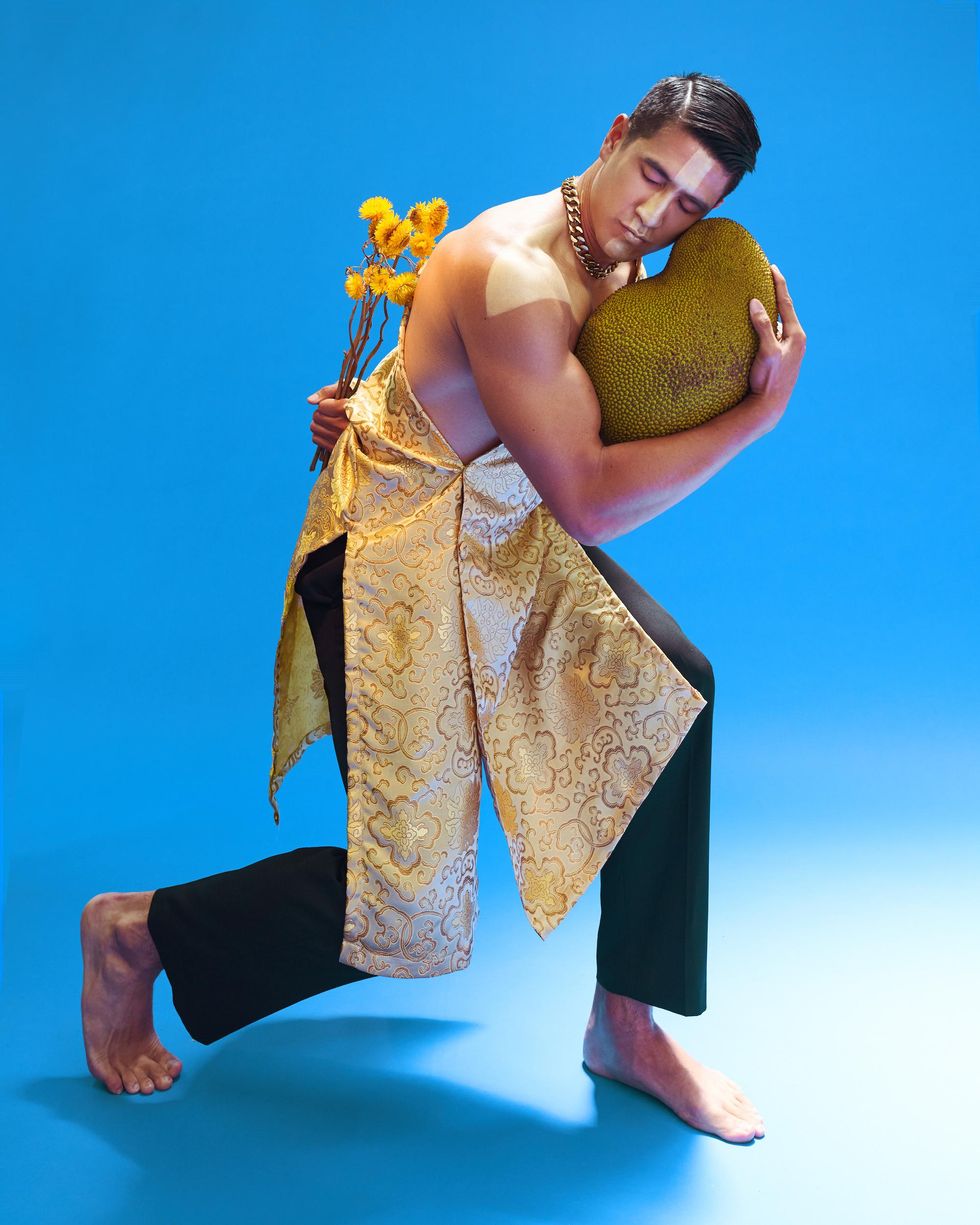
Necklace: Vitaly, Ao Dai: Stylist's own, Pants: Van Heusen
Sammy (he/him) is a Vietnamese and Mexican actor, model and stand-up comedian originally from San Diego, CA.
"My parents divorced when I was six. They remarried white people. We still celebrated Lunar New Year every year on my mother's side — my mother is Vietnamese and my dad is Mexican — but once my parents divorced I didn't get to be around [my Vietnamese culture] as much. Because I used to understand Vietnamese, and I used to understand a little bit of Spanish. But when they divorced and I grew up with my white parents, I just never spoke it as much around them. That's why I like projects like this, this is something I get very excited about, because I get to be in touch with my culture and I want to learn more about it, too.
I remember when I first wanted to do acting back in 2014, I was at work. I told my friends, but they all looked at me like, 'But they don't put Asian men on TV.' They all literally all said that unanimously. I remember being so discouraged. And I was like, I have two choices. I can listen to them, and say, 'OK, you're right,' and just wait until people put Asian people on TV, which would have been like last year or something. But I felt like in my intuition that we're gonna have a breakthrough, so I just grinded. And I overcame that. Now, because I didn't wait till 2021 to start my acting career, I'm already here — people know me. And now that more roles are available for Asian men, I'm already being considered for them.
You know what's funny — especially as I look back at it now — I think I was discriminated against in a way, like I was always looked down on as being a quiet, softer man. In my early 20s, girls would always say, 'Oh my God, you're so cute — for an Asian.' As I got older, I felt that they were still calling me ugly for some reason. I have a very predominant voice, and I like that about me. Because Asian men are known to be quite passive, and I want to break that stereotype. I want it to be more than just representation. Because when you see an Asian man, I don't want people to think like, there's a certain way you have to be, I just want younger Asian boys to know you just have to be yourself."
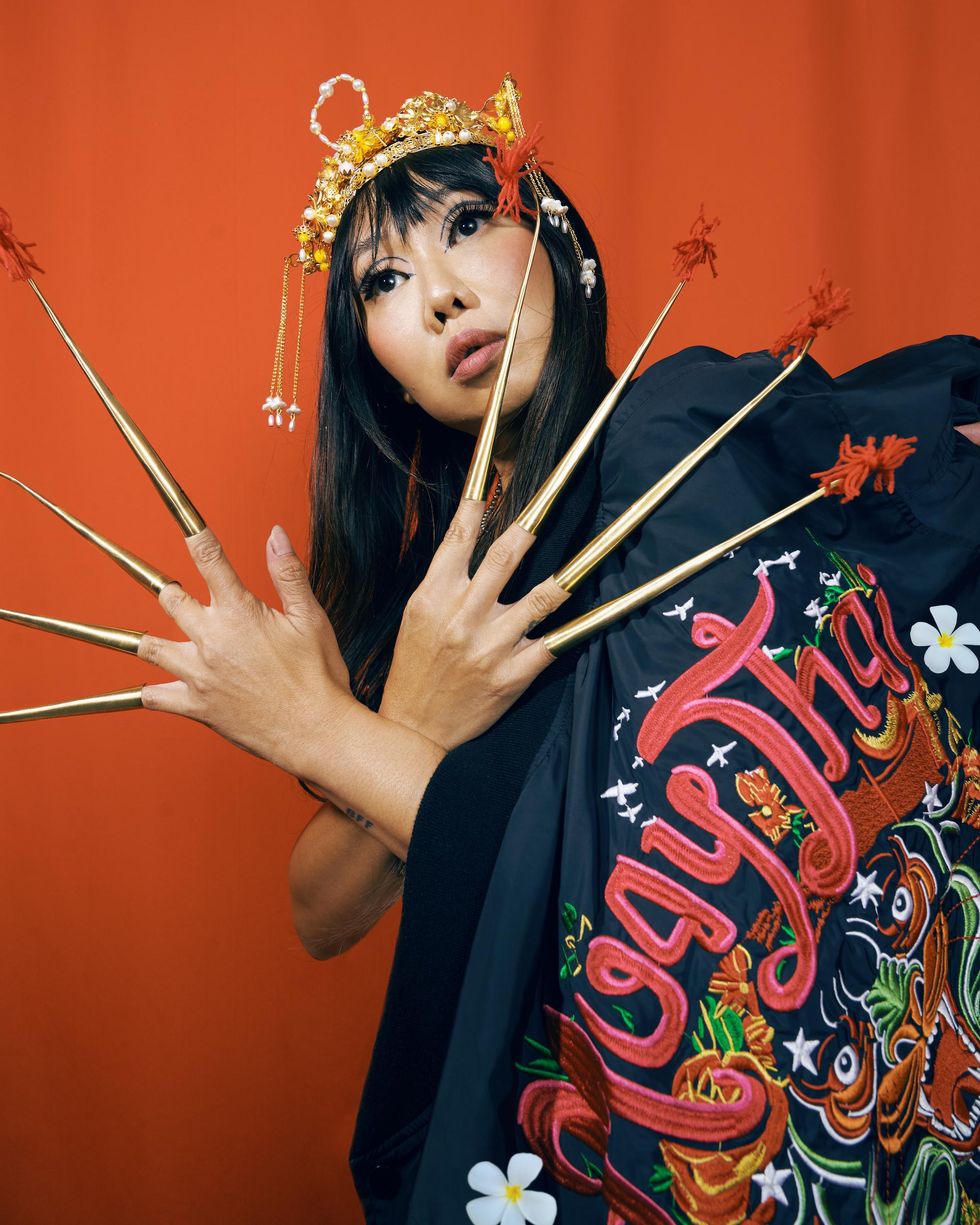
Headpiece: Darine's own, Nails: The Phukaw, Jacket: Roots of Fight, Dress: Shania Mote
Darine (she/her) is a Thai, Laotian and Chinese American hair stylist born and raised in Wichita, Kansas. She is now based in Los Angeles, CA.
"It's an ongoing internal struggle for me of being mixed Asian being Chinese, Thai and Laos, especially when seeing the classism between races. My father is Lao, and my mother is Thai and Chinese. When people would ask me what I am — I still do this — I'd say Thai or Chinese before Laos, just because people don't know what Laos is. But also because people think it's a smaller, less-developed country and not equal. When my family would fight, that would come out, even my grandparents didn't accept my dad for a while because of his nationality. Hearing that internally in my family like, 'Oh, Laos is not as nice as Thailand' or 'Lao people are low-class' — having those things in your head while trying to be okay with yourself and who you are was something I had to grow into.
I don't know if we've truly overcome it, because even now, they'll talk about different regions or countries, like the north of Thailand versus the south part of the country. It's something that I wish they could be more sensitive to or just aware of. I feel like, you know, now that we're all mixing everything up by dating across races, we should accept who we are. I'm proud of who I am now. Growing up, I just wanted to be American. Now, I like being unique. I like having a unique name, and I'm proud of my ethnicity like I never was before."
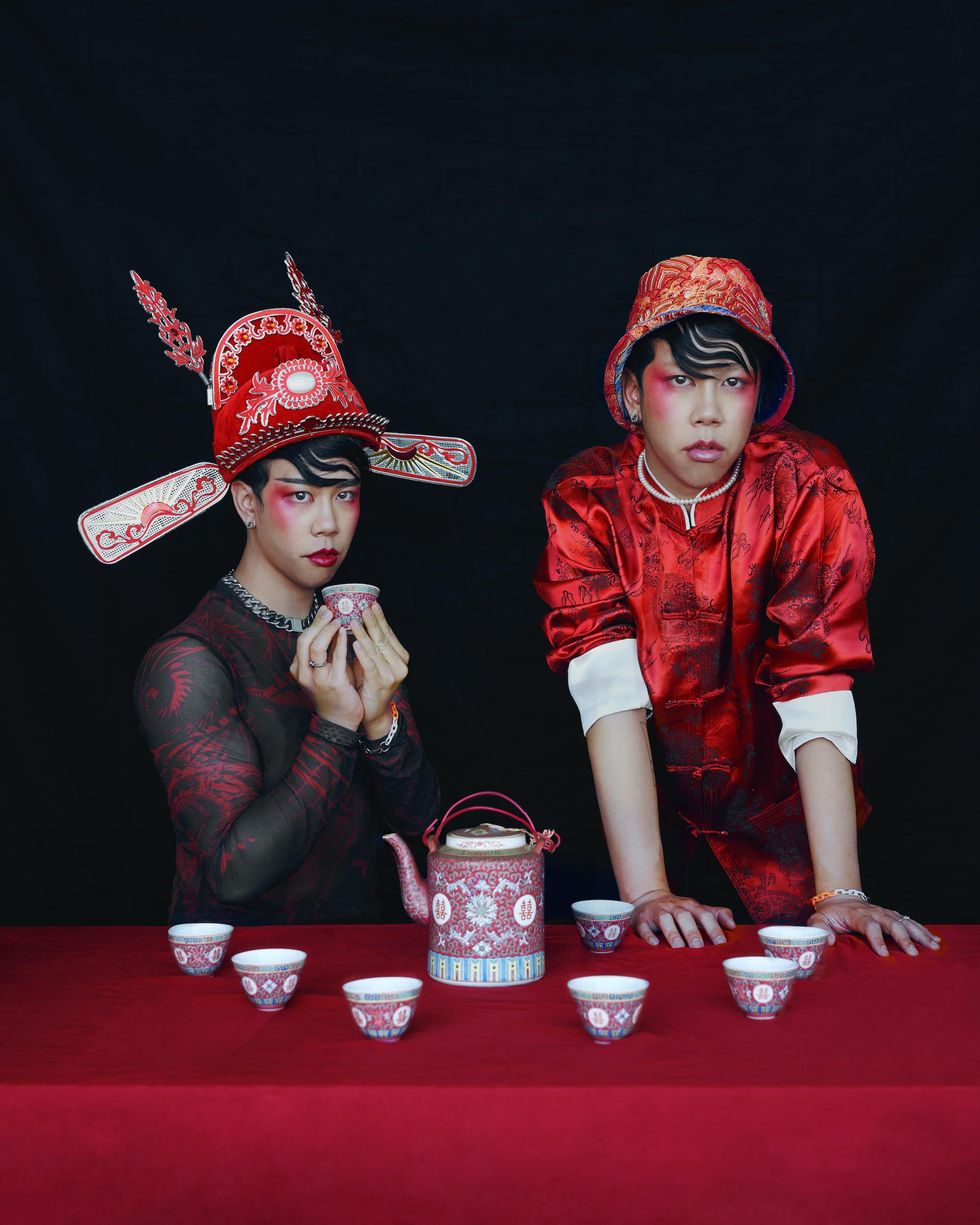
Headpiece: Edward's own, Hat: Dawang, Earrings: Gucci, Necklaces, bracelet, ring: Vitaly, Changshan: Edward's own, Top: Jaded London
Edward (they/them) is a non-binary Hongkongese American creative director based in New York. They are also co-founder of collagen beverage brand Crushed Tonic.
"My dad's whole life is about having a family — it was his main goal in life. My parents moved here from Hong Kong and had a lot of complications having me, so I'm actually an in vitro baby. I was supposed to have a twin, but my twin died in the womb. [Because of that], I put a lot of extra pressure on myself to be really perfect. But that was really hard because I was coming to terms with my identity. When I was younger, my mom was always scared I would be transgender. Anytime I looked a little bit too feminine, she would call it out. So that's been tricky to navigate, because I do identify as non-binary, but it just took me so long to accept that — or even just to realize that — and that's something that I revisit often.
[My mom's rejection of my femininity] was absolutely really hard for me because I idolized my mom so much. She's the matriarch of our family. Anytime anybody needs anything, she'll take care of it. And I've rarely ever seen her make a mistake. I've wanted to be like her my whole life. So it's really hard to hear whenever I try to resemble her, and she thinks that it's too feminine. But I think when it comes down to it — and this goes back to the background of how much they cared about me, how hard they tried to have me — at the end, they always just love me. I think one day we'll be able to see eye-to-eye. We'll always have different points of view, but at least we care about each other more than hurting each other.
The teapot and tea I have today is from my parents' wedding ceremony. It's symbolic of their love, which is very traditional. It's been so long and hard for me to come to terms with my sexuality, so I felt like paying homage to their love because that's ultimately what I've always wanted."
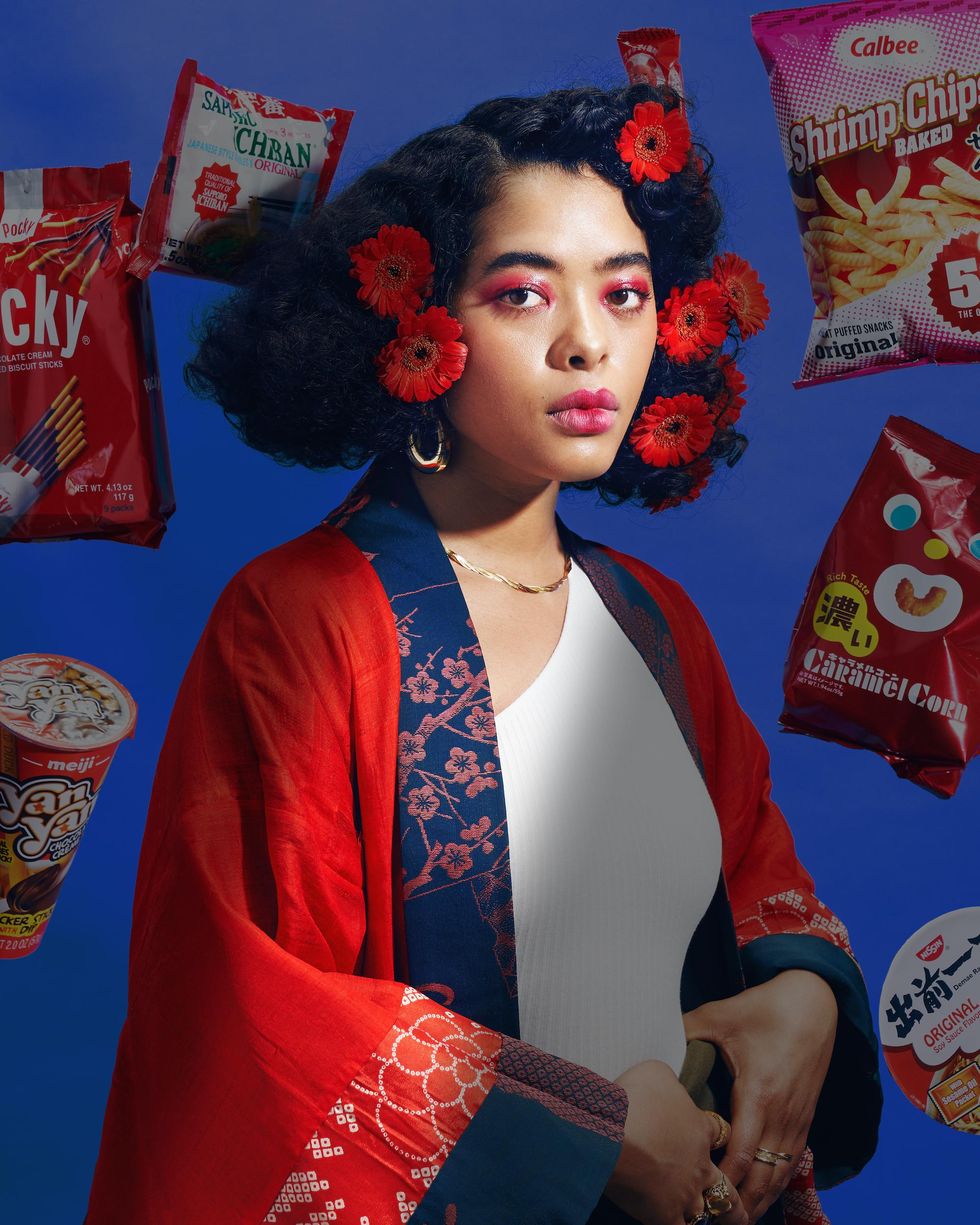
Earrings: Stylist's own, Necklace: Mika's own, Kimono: Mika's own, Bodysuit: Thursday Party, Rings: Mika's own
Mika (they/she) is a Black and Japanese visual artist born in Japan. They currently live in Los Angeles.
"My mom is from Okinawa, Japan and my dad is from Arkansas. My dad was stationed in Okinawa due to the military, and he met my mom overseas. I was born in Okinawa, so I had dual citizenship because I was born on base in Japan. I moved to the US when I was six or seven, but I spent all my years before in Japan. It was interesting because, I don't know — I didn't really realize I was an outsider. Because my grandparents were so warm and accepting of me. They made me feel like I belonged there. But once I stepped out of that environment, it's like, 'Oh, people are going to not even realize that you're Japanese.' Even if you're walking with your mom down the street. They think you're just visiting, tourists, or just military kids.
Plus, when I was a kid, I would get so tan in Japan. So they're always like, 'She's not Japanese, because she's so dark.' There's this word in Japanese that means foreigner, but in a derogatory sense. It judges people's physical appearance, like associating them with not being Japanese. I would get called that word a lot when I was in school, or when I would see other kids and we would try to be friends. And then going to the States, people are like, 'Oh, she's not really Black — she only eats Japanese food and speaks Japanese.' So it's this limbo — like, where do you go? Where do you fit in?
My dad went to Iraq, so me and my siblings got really close with my mom. It became like a really Japanese environment at home. And since he was away for work, we never really saw his family — I only knew one aunt who stayed in Oakland. That was like my only exposure to Blackness. I began to feel more connected with my Black identity in college, but at this point, as long as my family makes me feel at home, it doesn't really matter what other people say — that's what really matters to me."
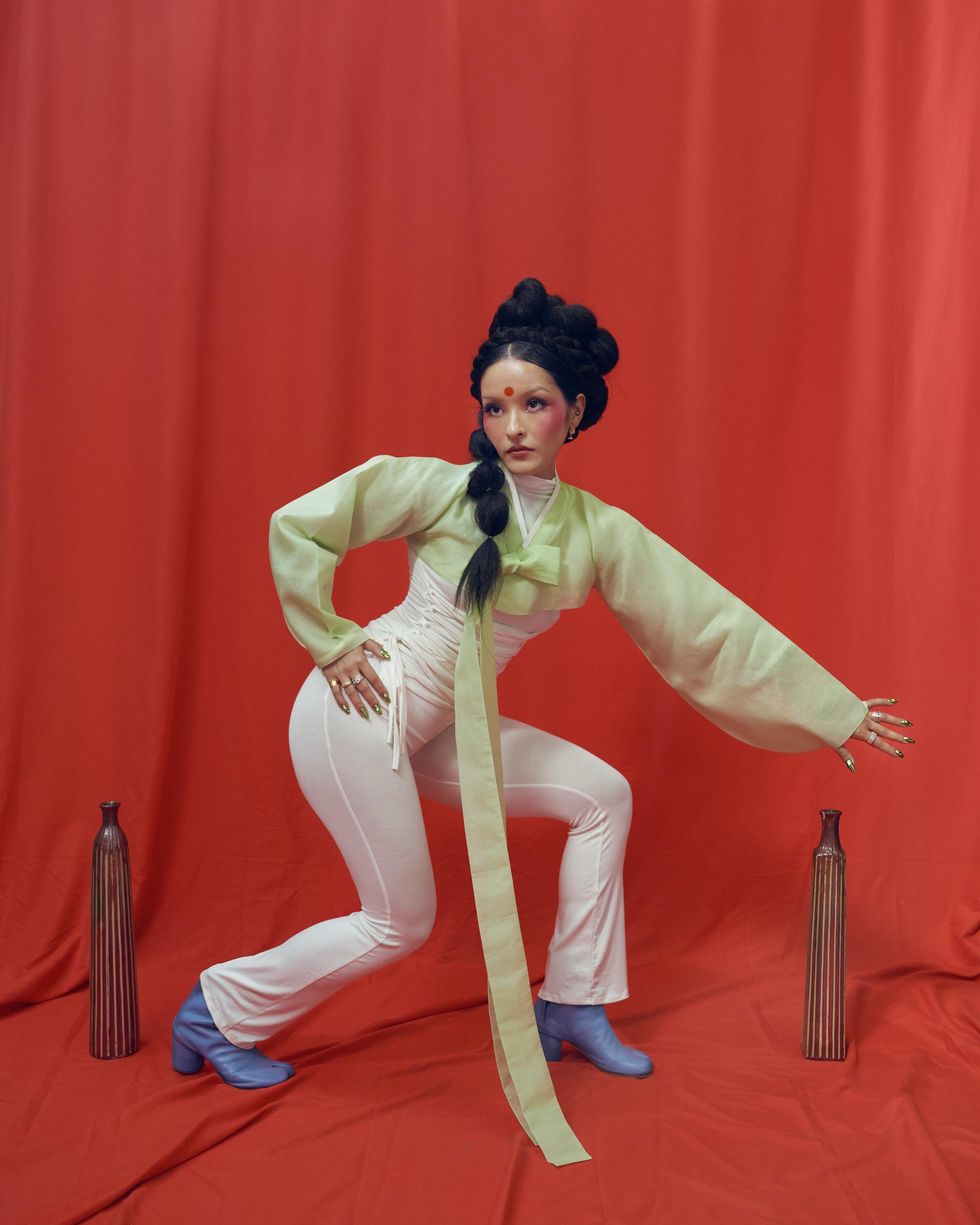
Earrings: Heji's own, Rings: Heji's own, Hanbok: Heji's own, Top: Thursday Party, Bottoms: Thursday Party, Shoes: Maison Margiela
Heji (she/her) is a Pakistani and Korean American stylist from San Antonio, TX currently based in Brooklyn, NY.
"Growing up, it was very interesting to be mixed South Asian and East Asian. A lot of the time, the two are often at odds with one another culture-wise. And living under one roof with parents who have very different ideologies, different beliefs and different ways of living was something that I felt I always had to reconcile — how do you reconcile such two such different cultures into one body, one mind, one soul?
When my parents were still together, my dad would play his classical [Pakistani] music, which is very loud. It's very expressive and very beautiful, but my mom hated the sound of it. And she would always get upset with him whenever he played in the house. I think there's something there with colorism, too, because you have the darker-skinned South Asian side — I just felt I never felt like I fit in with my family, because I was never Korean enough. Or I was never Pakistani enough. And it was just this odd feeling of being in limbo and not being able to see myself on either side.
But in the time that I've grown, I've become more connected to my identity, what it means to be Asian American, what it means to be Pakistani Korean American, and what it means to be Heji. I think all of those things have come together and helped me understand the uneasiness that I always felt growing up, but I could never put my finger on."
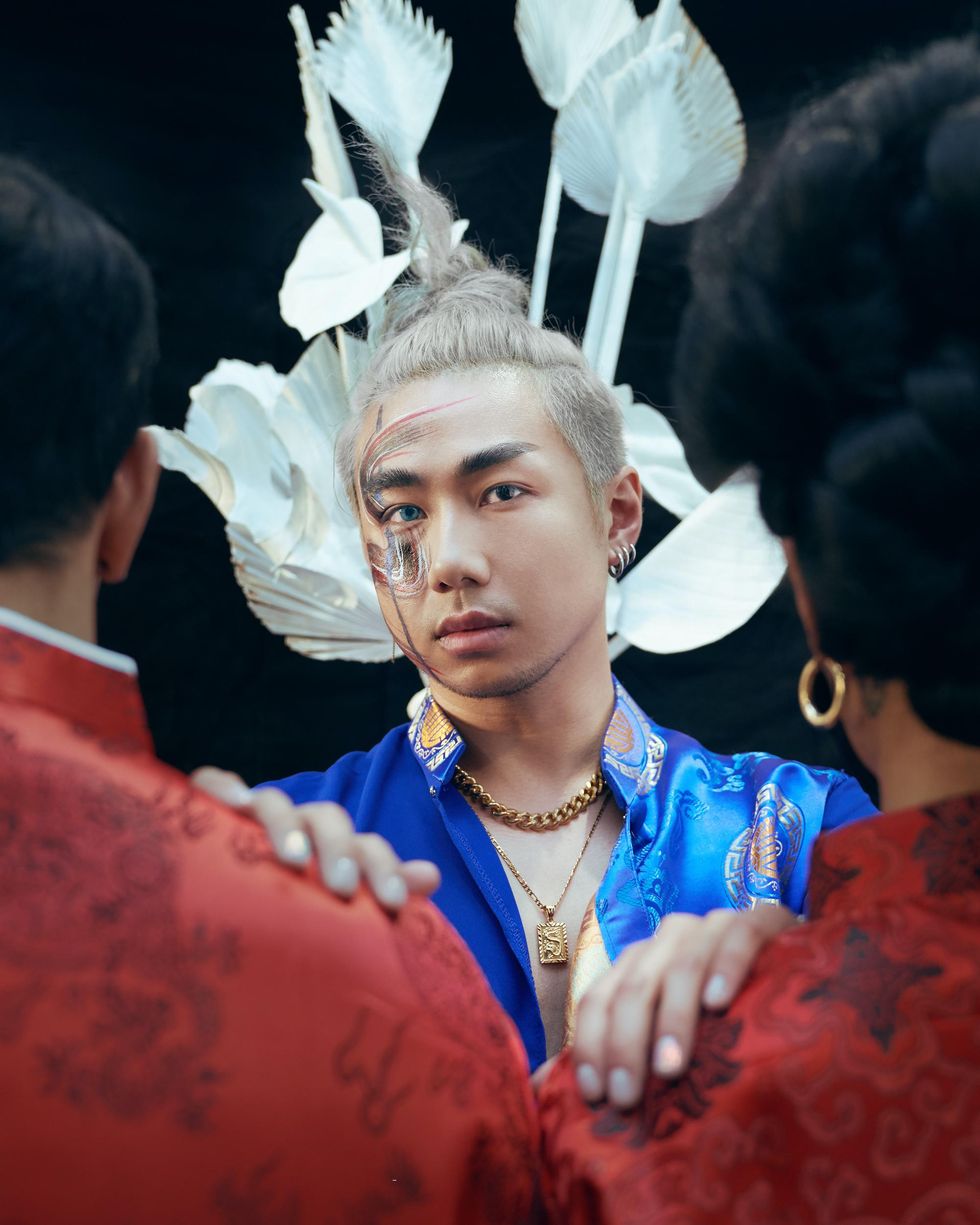
Chain: Martine Ali, Necklace: Peter's own, Ao Dai: Stylist's own
Peter (he/him) is a Vietnamese American visual artist based in Minneapolis specializing in makeup, photography and art installation.
"I always knew I was very artistic. My family knew that as well, but they were always more concerned about how I'm doing in school. As I was growing up, I didn't know that art could be a career. I felt very pressured into higher education, because that was the only thing that could lead to a viable career in their eyes. My parents are immigrants — they came as refugees from the Vietnam War — and they came here to make a better life for themselves. So that's all embodied in me.
When I went to college, I was about to pursue art education because it was a bit more stable, but I ended up choosing graphic design as a major. As I progressed, I got my first job, but eventually, I wanted to do my own thing. I wanted to be more creative. I didn't want to sit in the office all day, working on someone else's dreams. Moving out to California was actually a pivotal moment in my career. I was able to push and believe in myself, even when I didn't have their full support. When I come back home, they often ask, 'Oh, when will you find a real job?' I love my family, and I don't blame them because I know the hardships they have been through. I know they want the best for me. But what is a real job? To me, you should have goals and ambitions, regardless of the sacrifices you need to make along the way.
Right now, they're still on the fence about it. They support me in a way that's loving, but at the same time, it's hard because for them, money equals success. I view success as achieving your goals and being the best you can be. You just have to take the sacrifice for it."
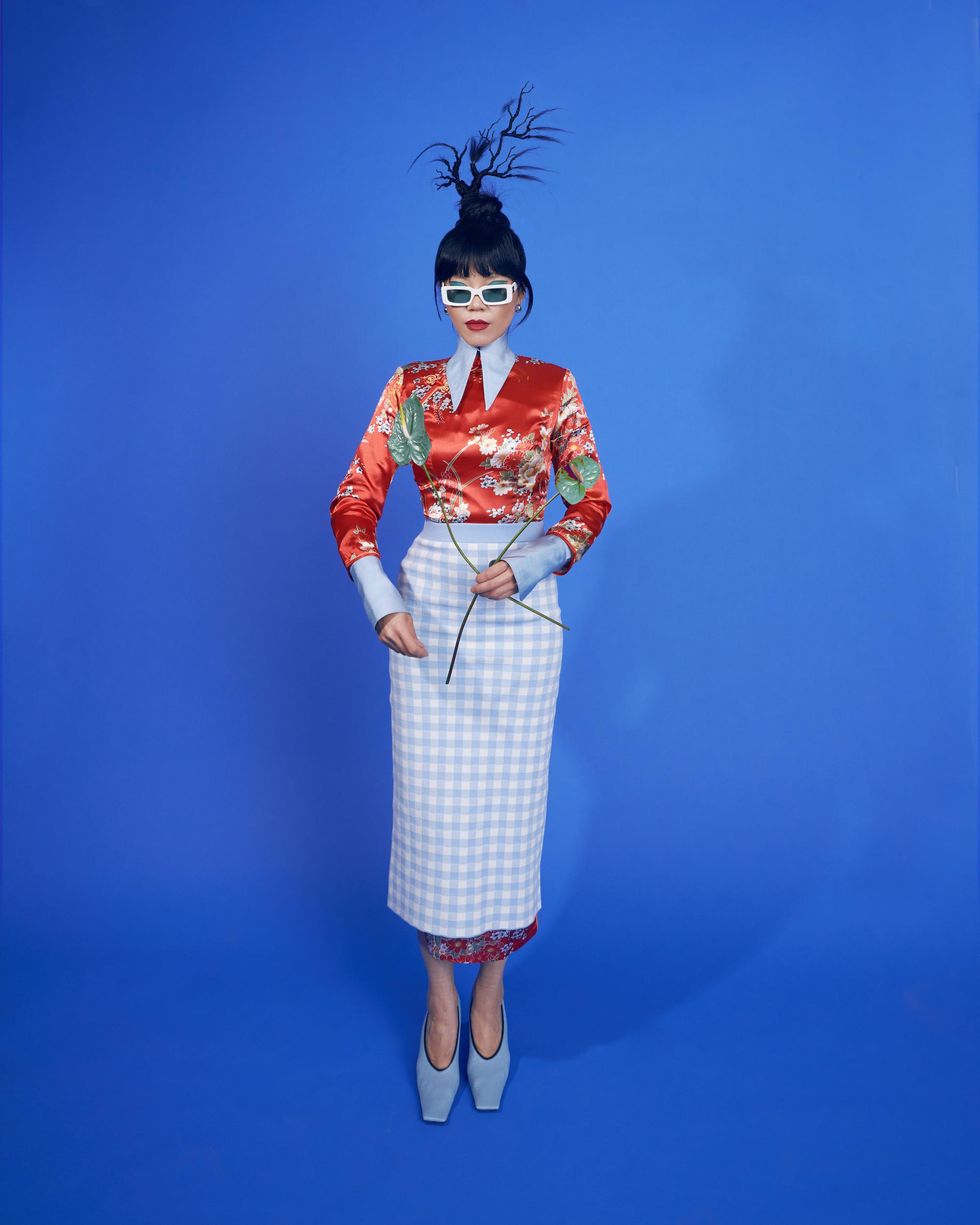
Sunglasses: Off White, Earrings: Shop Dela, Gold Blouse: Gucci, Qipao: Ruby's own, Skirt: Alessandra Rich, Shoes: Bottega Veneta
Ruby (she/her) is a Hongkongese American multidisciplinary creative based in Los Angeles.
"I don't think most Americans understand the difference between being from Hong Kong and being from China. They say, 'You're from Hong Kong? Oh, so you're Chinese.' It's such a privileged oversight for these Americans to so easily sweep that difference between Hong Kong and China under the rug. Hong Kong celebrates democracy, freedom of speech and individualism. Retaining their distinct identity is a fight to stand up for these values — but what happens when the world refuses your identity? Is there any safety or belonging left when you could instantly be disappeared for defending your freedom, your family or your livelihood?
I think many Americans have trouble relating to this because they have so much freedom of speech with little consequence. But that lack of distinction ignores that people in Hong Kong are censored, at risk of being disappeared or illegally detained, or can have their business shut down at any time. I'm proud to be Hongkongnese — I feel that my identity allows me to see the world with greater empathy. Even though it comes with greater complexities, exploring those nuances is not only a way for me to make sense of certain horrors, it's also a way for me to expand my empathy and understanding for matters encompassed with shame.
For me, taking pride in my identity means claiming freedom — the freedom to embrace my values and stand up for myself and my community in an effort to push the world closer towards a place where everyone is afforded their right to safety, love and belonging.
Some names have been changed for privacy reasons
Photography: Michelle Watt
Creative Direction: Edward Yeung & Eda Yu
Styling: Heji Rashdi
Makeup: Peter Phung
Hair: Darine Sengseevong
Hair Assistant: Carol Choi
Florals: Moon Jar Design
Set Design: Edward Yeung & Michelle Watt